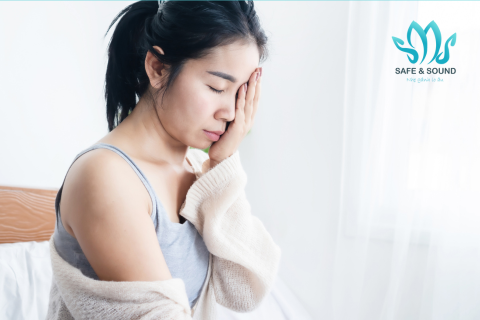5 Ways to Help You Sleep Better When Experiencing Stress-Related Insomnia | Safe and Sound
Pressure from work, finances, relationships or major changes happening in life makes you restless, have trouble sleeping or sleep poorly. And when this condition persists, it not only affects physical health but also causes many other psychological problems. In this article, psychological experts will give you 5 ways to help you sleep better, improve the quality of life better.
Phi Thuy Linh | Bachelor of Public Health – Mental Health Care Application Safe and Sound
Institute of Medical Technology Applications
1. Why does stress cause insomnia?

Stress causes the central nervous system to activate the "fight or flight" mechanism.
Stress is a natural reaction of the body when faced with pressure, challenges or major events that happen to you. When stress is prolonged or becomes severe, it can have a negative impact on your health, especially your sleep. Insomnia due to stress is a common condition and can happen to anyone, from students, office workers to businessmen or the elderly.
1.1. Mechanism by which stress causes insomnia
When you are stressed, your central nervous system activates the “fight-or-flight” mechanism. This is your body’s survival response to danger. This mechanism increases the production of the hormones cortisol and adrenaline, which puts your body in a state of alertness, increases your heart rate and blood pressure, and inhibits the relaxation processes necessary for sleep.
According to psychologists, stress can affect sleep through the following mechanisms:
- Increased brain activity : When you worry or think too much, your brain can't "turn off" to rest. You may get caught up in thoughts about work, finances, family, or stressful issues during the day, leading to difficulty sleeping or waking up in the middle of the night.
- Hormonal imbalance : Stress increases cortisol levels, while melatonin (the hormone that regulates sleep) is suppressed. This imbalance makes it difficult for you to get deep sleep and makes it easy to wake up.
- Increased heart rate and blood pressure : When the nervous system is stimulated, the heart beats faster and blood pressure increases. This creates a state of alertness, making it difficult for you to relax and fall asleep.
- Negative impact on sleep cycle : Stress can cause you to experience acute insomnia (occurring in a short period of time) or chronic insomnia (lasting more than 3 months), disrupting the body's natural biological rhythm.
1.2. What factors cause stress leading to insomnia?
There are many causes of stress, from work pressure, financial pressure to personal problems. Here are some common causes of stress causing insomnia:
- Work pressure : Stress due to deadlines, large workloads, expectations from superiors or conflicts at work make you anxious and have trouble sleeping.
- Financial problems : Worries about income, expenses, debt, bills or loans can create chronic stress, causing disrupted sleep.
- Conflict in relationships : Conflicts with family, friends or lovers make you think a lot and lead to insomnia.
- Stress from personal life : Major changes such as divorce, loss of a loved one, moving house or changing jobs can all cause stress and lead to poorer quality sleep.
- Health problems : Chronic illnesses, body aches or psychological disorders such as depression and anxiety can also increase stress levels and cause insomnia.
- Unhealthy living habits : Drinking too much coffee, using alcohol, smoking or staying up late to work can also increase stress and negatively affect sleep.

Alcohol use can increase stress and affect sleep.
1.3. Consequences of insomnia due to stress
Prolonged insomnia not only affects work productivity but also causes many physical and mental health problems. Psychologists warn that if this condition is not well controlled, you may face serious consequences such as:
- Decreased memory and concentration : When you don't get enough sleep, your brain can't process information effectively, making you forgetful, having difficulty concentrating, and reducing work performance.
- Increased risk of cardiovascular disease : Stress-induced insomnia is closely linked to high blood pressure, heart rhythm disturbances, and an increased risk of sudden cardiac arrest or stroke.
- Weakened immune system : The body needs sleep to recover and regenerate energy. When you lack sleep, your immune system weakens, making you more susceptible to disease.
- Increased risk of psychological disorders : Prolonged insomnia can lead to anxiety, depression and increase the risk of serious psychological disorders.
- Mood swings and irritability : People with insomnia often get angry easily, have difficulty controlling their emotions and are more easily agitated.
- Effects on weight : Lack of sleep can disrupt metabolism, making you more likely to gain weight or have digestive problems.
Therefore, to avoid the negative consequences of stress-induced insomnia, psychologists advise that you should find ways to control stress and apply methods to improve sleep as soon as possible.
2. Ways to help you sleep well when you have insomnia due to stress
2.1. Practice deep breathing and meditation before going to bed
One of the most effective ways to reduce stress and improve sleep is to practice deep breathing or meditation. Deep breathing techniques help reduce cortisol levels, putting your body into a state of relaxation.
How to do:
- You can sit or lie down comfortably with your eyes closed.
- Inhale deeply through your nose for 4 seconds, hold for 7 seconds.
- Exhale slowly through your mouth for 8 seconds.
- Repeat this cycle 5-10 times.
Many psychologists say that practicing breathing exercises for 10-15 minutes before going to bed helps reduce anxiety, create calmness and improve sleep quality.
2.2. Create a habit of sleeping on time
Establishing a fixed sleep schedule helps the body readjust its biological rhythm, thereby minimizing insomnia caused by stress.
How to do:
- Go to bed and wake up at the same time every day, even on weekends.
- Avoid napping for too long (no more than 30 minutes) so as not to affect your nighttime sleep.
- Create a quiet, dark and cool sleeping space.
According to psychologists, people who maintain scientific sleeping habits are often less stressed and have better sleep quality.
2.3. Limit exposure to blue light before bed
Blue light from your phone, computer, or TV can reduce the production of melatonin – an important hormone that helps you sleep better.
How to do:
- Avoid using electronic devices at least 1 hour before bed.
- Use "Night Mode" or wear blue light filter glasses.
- Replace scrolling through your phone with reading a book or listening to light music.
Psychologists recommend that limiting exposure to blue light will help the brain receive signals to prepare for sleep naturally.
2.4. Do light exercise in the evening
Light exercise before bed helps the body relax, reduces stress and improves sleep quality.
How to do:
- Do gentle yoga exercises or take a relaxing walk 15-30 minutes before going to bed.
- Avoid high-intensity exercise in the evening as it can stimulate the body to stay awake.
- Combine exercise with breathing techniques or meditation for optimal results.
According to psychologists, people who maintain the habit of light exercise before bed often have deeper and more stable sleep.
2.5. Using psychotherapy to control stress
If you have persistent insomnia due to stress, you may be suffering from an anxiety disorder or depression. In this case, a psychologist can help you apply appropriate therapies to control stress and improve sleep.
Some common therapies:
- Cognitive behavioral therapy (CBT) : Helps you change negative thoughts about sleep and reduce anxiety.
- Relaxation therapy : Includes breathing exercises, meditation, yoga to reduce stress.
- Sound therapy : Use white noise or relaxing music to help you sleep better.
Many psychologists recommend that if you have tried many methods but still cannot improve your sleep, seek professional support for appropriate solutions.
Insomnia due to stress not only affects physical health but also reduces mental health and work performance. By applying the above 5 methods, you can improve sleep quality and reduce stress effectively.
If you have tried many ways but still cannot sleep well, do not hesitate to seek psychological experts for advice and in-depth support. A good night's sleep not only helps you stay more alert but also improves mental health, helping you overcome stress more quickly.
Safe and Sound Clinic - Family health and psychological support
With a team of experienced doctors and specialists, Safe and Sound Clinic is a pioneer in comprehensive health care with health care services from medicine to psychology.
“Early prevention - Timely support - Long-term companionship”.
If you have any doubts or experience any physical or mental health problems, please contact HOTLINE 0964 778 911 (Phone/Zalo, 24/7) for answers and support as soon as possible!
HOW TO MAKE AN APPOINTMENT for online or in-person consultation with an expert
- At SnS Clinic - IMT Institute
- Or download and schedule a consultation on the Safe and Sound app to manage and track your schedule anytime, anywhere.
Safe and Sound (SnS) - Institute of Applied Medical Technology (IMT)
See also:
- Instructions on how to set up a regular sleep schedule to help treat insomnia at night
- Top 6 natural ways to reduce stress and cure insomnia effectively




